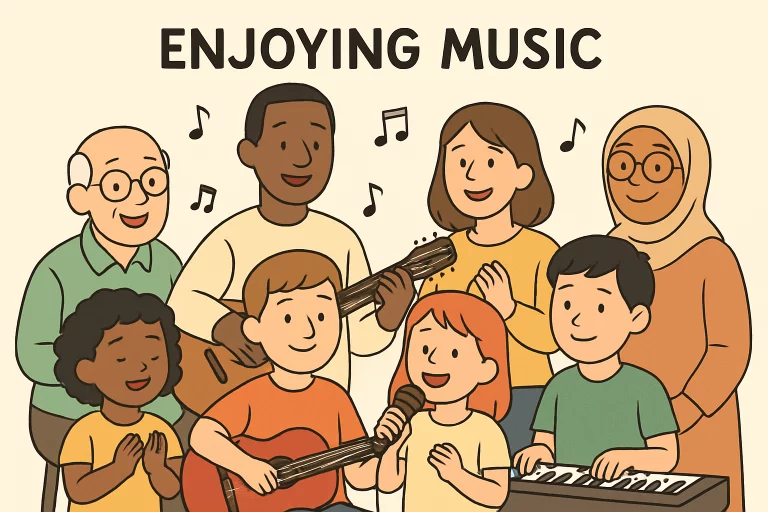Key Takeaways
- Community involvement is crucial for sustaining and enriching music education programs.
- Creative fundraising events can generate financial support and strengthen community bonds.
- Leveraging technology and social media can broaden the reach and impact of music education initiatives.
Direct donations are crucial, but creative strategies can raise funds and foster community unity. Parents, teachers, business owners, and those passionate about the arts can contribute to keeping music alive in their communities. These approaches stimulate engagement and foster a culture of support beyond monetary contributions. Individuals and organizations can significantly impact music education through diverse and innovative techniques.
Music education is much more than simply learning to play an instrument; it’s an avenue for self-expression, collaboration, and lifelong skills that influence cognitive development, discipline, and creativity. Yet, countless schools face tough budgetary decisions that threaten to cut or reduce their music programs. When resources dwindle, the task of preserving music education becomes a collective responsibility, calling for inventive thinking and broad community participation. By coming together, communities can discover opportunities not only to fund programs but to cultivate a shared appreciation for the arts. If you’re looking for practical starting points, visit https://www.savethemusic.org/take-action/ways-to-donate/ to see immediate ways to provide support and resources.
Host Benefit Concerts
Hosting benefit concerts is a way to support local music education and bring people together. These can become signature community events, drawing audiences eager to see students and local performers shine. The energy, creativity, and talent displayed at these events foster deep community pride and remind everyone of the arts’ invaluable role in education. For example, an Oregon elementary school showcased the talents of its students and area musicians, raising substantial funds through a series of successful, sold-out talent shows. These events support programs financially and create cherished collective memories, strengthen a sense of belonging, and raise awareness for the cause. To get started, work closely with music teachers, school administrators, and parent committees to organize the event, encourage participation from student musicians, choir groups, marching bands, and soloists, and promote the concert extensively using flyers, press releases, announcements at school assemblies, and social media updates.
Organize Music Workshops
Music workshops provide a dynamic, hands-on approach to fostering interest and engagement in music, suitable for all age groups and skill levels. These interactive sessions, facilitated by local musicians, offer a low-pressure environment for exploration and learning. Participants gain expert insight and build mentor relationships, nurturing budding talent. Workshops can range from introductory lessons on popular instruments, vocal techniques, and electronic beat-making to advanced clinics for songwriting and arranging. Recurring workshops maintain enthusiasm and ensure community investment in music education. Themes for workshops include instrument “petting zoos,” exploring global music styles, digital music production, and songwriting clinics. These workshops provide students and community members opportunities to network, discover new genres, and build supportive friendships rooted in a shared love for music
Leverage Social Media Campaigns
Social media platforms are crucial for music education advocacy, as they allow for sharing inspiring stories, achievements, and support from a wider community. Engaging videos, creative hashtag campaigns, and musical challenges can increase empathy and enthusiasm among supporters. Hosting livestream events or virtual open mic sessions allows people from anywhere to join in, donate, or show their support. Best practices for online promotion include regularly posting short clips or highlights, hosting virtual open mic nights or streamed jam sessions, sharing personal anecdotes and milestones, and collaborating with local influencers, musicians, and businesses to reach broader audiences and add credibility to the campaign.
Partner with Local Businesses
Building strong partnerships with local businesses can provide significant financial and in-kind support for music programs. Companies can contribute money, raffle prizes, and become venues for community events, sponsor music-related contests, or offset logistical costs. For example, a neighborhood restaurant can hold a benefit night with a portion of proceeds supporting music education, or a print shop can donate flyers and posters for upcoming events. These relationships build a support network and create valuable goodwill for schools and businesses, reinforcing the idea that a strong arts program benefits everyone in the community. Collaboration opportunities include sponsoring events, arranging performances at local venues, and partnering with craft stores or music retailers to donate instruments, sheet music, or art materials to schools and students in need.
Utilize Crowdfunding Platforms
Crowdfunding is a powerful tool for securing financial support from a large audience, even if the individual contributions are small. Educators and community leaders can clearly outline specific needs, such as purchasing new instruments or supporting field trips. Visual storytelling, such as sharing photos and videos, increases trust and motivates donor engagement. Crowdfunding is highly transparent, allowing for easy demonstration of how funds are used and highlighting results, which can inspire further giving. Promote campaigns widely through social media, emails, newsletters, and personal outreach to succeed. Be specific with your ask, using visuals and real stories of students, teachers, or projects. Keep donors informed with regular progress reports and personalized thank-you messages.
Engage Schools and Universities
Building strong connections between local schools, universities, and music organizations can lead to growth, skill-building, and advocacy. Universities can coordinate district-wide music festivals, internships, and collaborative concerts, exposing K-12 students to advanced musical skills and mentorship. These partnerships increase visibility for music programs, rallying parents, alumni, and community support. University musicians or faculty members can lead outreach programs, lessons, or clinics, nurturing the next generation of musicians, educators, and audiences. Collaborations can bridge age gaps, sustain momentum for music advocacy, and pave pathways to higher music education or professional careers. Examples include developing annual multi-school music festivals, inviting university music students or faculty for coaching, and using university concert halls for school and community music events.
Implement Technology Tools
Technology is revolutionizing music education by making it more accessible and interactive. Digital Audio Workstations (DAWs) enable students to compose, arrange, and produce their music, making learning fun, adaptable, and personalized. These tools also provide virtual instruments and interactive tutorials, enabling those without access to costly equipment or private lessons to learn. These tools democratize access to music education and spark curiosity and motivation in new learners, equipping them with skills for lifelong creative pursuits. Examples of technology in music education include classroom projects using free DAW applications, interactive online tutorials combining video lessons, practice tools, quizzes, and accessible virtual instrument apps covering piano, guitar, and drums. Music education extends beyond the classroom, nurturing confidence, perseverance, teamwork, and creativity that impact a child’s development. By embracing these creative and collaborative approaches, anyone can play an essential role in safeguarding the future of music programs.
READ ALSO: Staying Safe as a Pedestrian: Essential Precautions in a Busy World







